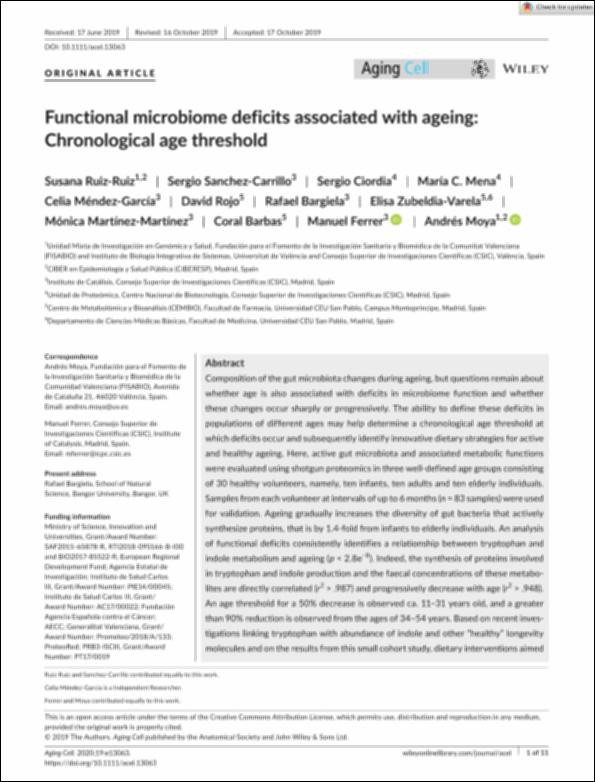Por favor, use este identificador para citar o enlazar este ítem:
http://hdl.handle.net/10637/15314Functional microbiome deficits associated with ageing: Chronological age threshold
| Título : | Functional microbiome deficits associated with ageing: Chronological age threshold |
| Autor : | Ruiz-Ruiz, Susana Sanchez-Carrillo, Sergio Ciordia, Sergio Mena, María C. Méndez-García, Celia Rojo Blanco, David Bargiela, Rafael Zubeldia Varela, Elisa Martínez-Martínez, Mónica Barbas Arribas, Coral. Ferrer, Manuel Moya, Andrés |
| Materias: | Ageing; Indole; Metabolomics; Microbiome; Proteomics; Tryptophan |
| Editorial : | Wiley Open Access |
| Citación : | Ruiz-Ruiz S, Sanchez-Carrillo S, Ciordia S, Mena MC, Méndez-García C, Rojo D, Bargiela R, Zubeldia-Varela E, Martínez-Martínez M, Barbas C, Ferrer M, Moya A. Functional microbiome deficits associated with ageing: Chronological age threshold. Aging Cell. 2020 Jan;19(1):e13063. doi: 10.1111/acel.13063. Epub 2019 Nov 15. PMID: 31730262; PMCID: PMC6974723. |
| Resumen : | Composition of the gut microbiota changes during ageing, but questions remain about whether age is also associated with deficits in microbiome function and whether these changes occur sharply or progressively. The ability to define these deficits in populations of different ages may help determine a chronological age threshold at which deficits occur and subsequently identify innovative dietary strategies for active and healthy ageing. Here, active gut microbiota and associated metabolic functions were evaluated using shotgun proteomics in three well‐defined age groups consisting of 30 healthy volunteers, namely, ten infants, ten adults and ten elderly individuals. Samples from each volunteer at intervals of up to 6 months (n = 83 samples) were used for validation. Ageing gradually increases the diversity of gut bacteria that actively synthesize proteins, that is by 1.4‐fold from infants to elderly individuals. An analysis of functional deficits consistently identifies a relationship between tryptophan and indole metabolism and ageing (p < 2.8e−8). Indeed, the synthesis of proteins involved in tryptophan and indole production and the faecal concentrations of these metabolites are directly correlated (r2 > .987) and progressively decrease with age (r2 > .948). An age threshold for a 50% decrease is observed ca. 11–31 years old, and a greater than 90% reduction is observed from the ages of 34–54 years. Based on recent investigations linking tryptophan with abundance of indole and other “healthy” longevity molecules and on the results from this small cohort study, dietary interventions aimed at manipulating tryptophan deficits since a relatively “young” age of 34 and, particularly, in the elderly are recommended. |
| URI : | http://hdl.handle.net/10637/15314 |
| Derechos: | http://creativecommons.org/licenses/by-nc-nd/4.0/deed.es Open Access |
| ISSN : | 1474-9718 |
| Fecha de publicación : | 15-nov-2019 |
| Centro : | Universidad San Pablo-CEU |
| Aparece en las colecciones: | Medicina |
Los ítems de DSpace están protegidos por copyright, con todos los derechos reservados, a menos que se indique lo contrario.


